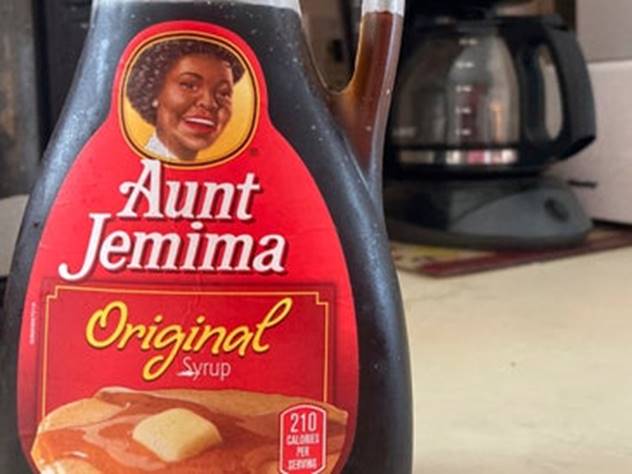
*Aunt Jemima’s great-grandson has slammed Quaker Oats decision to retire her image from the brand’s logo, pancakes and syrup products.
We previously reported… it took more than a century, and the violent, senseless murder of a black man by a police officer, but Quaker Oats announced Wednesday that it will get rid of its “Aunt Jemima” brand name and replace it with a new name and image, saying they recognize that “Aunt Jemima’s origins are based on a racial stereotype.”
The decision is in response to the civil unrest and protests sparked by the killing of George Floyd, a Black man who died in custody of Minneapolis police.
“This is an injustice for me and my family. This is part of my history, sir,” Larnell Evans Sr. told Patch. “The racism they talk about, using images from slavery, that comes from the other side — white people. This company profits off images of our slavery. And their answer is to erase my great-grandmother’s history. A black female. … It hurts.”
Here’s more from the outlet:
The first “Aunt Jemima” debuted at Chicago’s World’s Fair in 1893. Former enslaved woman Nancy Green, who worked as a cook on the South Side, was hired to wear an apron and headscarf while serving pancakes to folks who came to visit the fairgrounds known as “The White City.” Green embodied the Aunt Jemima character until her death in 1923.
That’s when Evans’ great-grandmother — the late Anna Short Harrington — was tapped to take Green’s place.
OTHER NEWS YOU MIGHT HAVE MISSED: Pissed Off Shopper Goes At Ex-cop (J. Alexander Kueng) in George Floyd Murder / WATCH
JUST IN: Quaker Oats is removing the name and image of Aunt Jemima from the brand in effort “to make progress toward racial equality.” https://t.co/OP2HifCs1W
— MSNBC (@MSNBC) June 17, 2020
The report goes on to say:
Quaker Oats used Harrington’s likeness on products and advertising, and it sent her around the country to serve flapjacks dressed as “Aunt Jemima.” The gig made her a national celebrity.
Quaker Oats also used Harrington’s pancake recipe, Evans and a nephew claimed in a 2014 lawsuit seeking $3 billion from Quaker Oats for not paying royalties to Harrington’s descendants. The attempt to make Quaker Oats pay restitution in federal court failed.
“She worked for that Quaker Oats for 20 years. She traveled all the way around the United States and Canada making pancakes as Aunt Jemima for them,” Evans said. “This woman served all those people, and it was after slavery. She worked as Aunt Jemima. That was her job. … How do you think I feel as a black man sitting here telling you about my family history they’re trying to erase?”
“How many white people were raised looking at characters like Aunt Jemima at breakfast every morning? How many white corporations made all them profits, and didn’t give us a dime? I think they should have to look at it. They can’t just wipe it out while we still suffer,” he added.
Aunt Jemima’s Great-Grandson Enraged Her Legacy Is Vanishing https://t.co/gJ895jdE1q
— Patch Chicago (@chicagopatch) June 18, 2020
“After making all that money —and now’s the time when black people are saying we want restitution for slavery — they’re just going to erase history like it didn’t happen? … They’re not going to give us nothing? What gives them the right?”
In an earlier report on EURweb.com, we noted that the 130-year-old brand features a Black woman named Aunt Jemima, who was originally dressed as a minstrel character. The picture has changed over time, and in recent years Quaker removed the “mammy” kerchief from the character in an attempt to quell growing criticism that the brand perpetuated a racist stereotype that dated to the days of slavery.
But Quaker, a subsidiary of PepsiCo, said Wednesday that removing the image and name altogether is part of an effort by the company “to make progress toward racial equality,” and that the company had worked to “update” the brand to be “appropriate and respectful” but realized the changes were insufficient.
Watch Today’s report on the name ditch below, or here.
We Publish News 24/7. Don’t Miss A Story. Click HERE to SUBSCRIBE to Our Newsletter Now!





